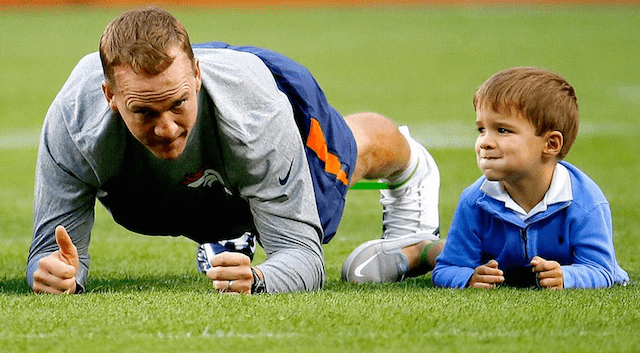9 Reasons That Peyton Manning Did Not Take HGH

There are nine good reasons that Peyton Manning did not take HGH. All nine were available to him, and none were banned substances. You can be sure that Peyton benefited by some of these natural solutions.
OVER THE next few news cycles, we’re going to get bombarded with Al Jazeera’s allegation that Peyton Manning, quarterback of the Denver Broncos, and several other athletes have taken Human Growth Hormone (“HGH”).
HGH is an illegal performance-enhancing drug, among other things. As informed by a once-upon-a-time interin at the clinic where Manning allegedly got his HGH doses, Al Jazerra – perhaps in an effort to boost its bottom line with the inevitable bounty of ad revenue – posted a documentary online earlier today (Sunday, December 27, 2015), which will also be aired on TV later in the day.
In high dramatic form, Al Jazerra calls the documentary, The Dark Side.
The then-intern, now pharmacist, Charlie Sly, allegedly spoke to an undercover reporter working for Al Jazeera and named Peyton Manning as one of several athletes that received the banned substance from the Guyer Institute, named after Manning’s doctor, Dr. Dale Guyer.
When asked if it were true by ESPN’s Chris Mortensen, Manning said,
“The allegation that I would do something like that is complete garbage and is totally made up,” (1)
I believe him.
I believe not because I know him or have studied his character, but because neither Peyton Manning nor any other athlete who does High Intensity Interval Training and has access to a host of legal performance enhancing supplements needs to risk their careers, reputations and incomes by taking illegal drugs.
The Al Jazerra documentary also alleges that Philadelphia Phillies first baseman Ryan Howard, Washington Nationals infielder Ryan Zimmerman and boxer Mike Tyson HGH shipments from Charlie Sly while he worked as an Interin at the Guyer Institute. (2)
Now maybe those baseball guys could use a boost, because their sports don’t require much HIIT and resistance training, but the others could find safer and less risky ways to improve performance.
That said, here are 9 reasons why Peyton Manning, and anyone else who consistently works out vigorously doesn’t need HGH and other performance-enhancing drugs.
1. Do High Intensity Interval Training (“HIIT”).
HIIT can boost HGH by 771%, according to Drs. Campbell and Mercola.
The reason anybody past his or her mid-twenties would want more HGH is because it keeps you young and virile, and you begin to lose it fast starting about the time you’re a teenager.
So we have incentive.
But we also have a few different ways to boost HGH other than taking the actual hormone itself.
Here’s Joseph Mercola being taken through the HIIT paces by Dr. Campbell, and expert on exercise physiology:
HIIT is also called “Burst Training”, because the practitioner’s heart rate bursts above their anaerobic threshold as established by VO2 max testing. These “bursts” can be done five or more times per workout for 30 or more seconds per burst.
As you can imagine, any football player – even a quarterback like Manning – will do HIIT as part of their workouts.
2. Take Branch Chain Amino Acids (“BCAA”).
This is done prior to and during HIIT and/or resistance training. This will help with performing the exercise and quickly recovering from its catabolic impact.
3. Consume high quality protein.
Whey protein is the best post-workout protein to consume because it is quickly absorbed into the blood stream and begins to feed the muscles fast.
Ideally, use whey protein that comes from range fed, grass eating cows that haven’t been pumped up by hormones and antibiotics.
4. Take L-arginine and L-lysine prior to exercise.
These two amino acids combined before exercise can boost HGH production by up to 700%, says Dr. Mike Carragher. (3) Take 3 to 5 grams for best results.
5. Take Glutamine.
Glutamine is an amino acid that is used in the biosynthesis of proteins. Take 2 to 10 grams of glutamine after a workout or before bed.
A study conducted by researchers at the Louisiana State College of Medicine gave subjects 2 grams of glutamine, which increased their HGH levels. (4)
6. Take Alpha-glycerylphosphorylcholine (“A-GPC”).
A study published in the September 2008 issue of the “Journal of the International Society of Sports Nutrition” says that subjects taking 600 mg of A-GPC two hours before resistance exercise had higher HGH levels post-exercise compared with those who consumed a placebo. (5)
7. Optimize Vitamin D levels at 70 – 100 ng/mL. (6)
Not only can Vitamin D increase HGH production, but also can dramatically increase athletic performance, according to research published in 2009. Activated vitamin D is a steroid hormone, which regulates more than 1,000 human genes. (7)
8. Sleep soundly.
Get enough sleep, usually 8 hours, which melatonin can help you do. Take it right before bed, 0.5 to 5 mg. Sublingual seems to work best (the kind that dissolves under the tongue.)
9. Avoid sugar.
It’s always a good idea to avoid sugar, and not just the kind poured into coffee, but the various forms lurking in most processed foods and simple carbs, like bagels.
Avoiding sugar is a particularly after workouts, because consuming sugar within two hours of exercise will decrease HGH production, and spike insulin levels, leadig to body fat storage.
So there you have it, nine reasons that athletes like Peyton Manning do not need to take performance-enhancing drugs like HGH.
And neither do you.
Last Updated on November 8, 2022 by Joe Garma



